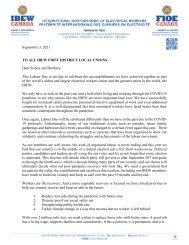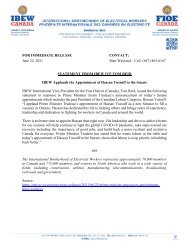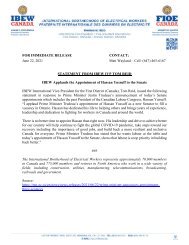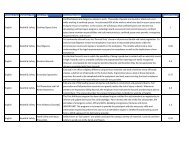DB Pensions - Know the Facts
Create successful ePaper yourself
Turn your PDF publications into a flip-book with our unique Google optimized e-Paper software.
DEFINED BENEFIT<br />
PENSION PLAN<br />
KNOW THE<br />
FACTS
DEFINED BENEFIT<br />
PENSION PLAN<br />
A Defined Benefit Pension Plan is insurance<br />
against senior poverty.<br />
But some special interest groups are lobbying<br />
for <strong>the</strong>se plans to be replaced by Defined<br />
Contribution plans.<br />
But Defined Contribution plans leave many<br />
seniors unable to retire in dignity.<br />
This booklet examines both retirement<br />
funding alternatives. It shows <strong>the</strong> facts,<br />
exposes <strong>the</strong> myths, looks at relevant history,<br />
considers what <strong>the</strong> experts are saying, and<br />
suggests how Defined Benefit plans could be<br />
adjusted to ensure <strong>the</strong>y are affordable.<br />
– 1 –
THE DIFFERENCE<br />
Defined Benefit pensions guarantee retirees a<br />
fixed amount of pension payments for life.<br />
They will not outlive <strong>the</strong>ir pensions.<br />
Defined Contribution pensions are really just<br />
RRSPs, and as such, <strong>the</strong>ir value goes up and<br />
down with <strong>the</strong> markets. There is no guarantee<br />
<strong>the</strong>y will provide enough to retire on, and in a<br />
great many cases, <strong>the</strong>y don't.<br />
– 2 –
THE FACTS<br />
There is a considerable body of research<br />
comparing Defined Benefit and Defined<br />
Contribution pension plans, and <strong>the</strong><br />
overwhelming conclusion is that Defined<br />
Benefit plans are best for employees,<br />
employers, and taxpayers in general.<br />
Part of <strong>the</strong> reason is because <strong>the</strong>y are<br />
cheaper. The research, including extensive<br />
financial modeling by <strong>the</strong> National Institute on<br />
Retirement Security, shows that a Defined<br />
Benefit plan can provide <strong>the</strong> same level of<br />
retirement benefits as a Defined Contribution<br />
plan at about half <strong>the</strong> cost. (46% lower)<br />
46%<br />
– 3 –
THE MYTH<br />
THAT DEFINED<br />
CONTRIBUTION PLANS<br />
ARE CHEAPER<br />
Often when a switch from Defined Benefit to<br />
Defined Contribution is made, employers will<br />
use <strong>the</strong> change as an opportunity to reduce<br />
<strong>the</strong> amount <strong>the</strong>y contribute. Of course this<br />
saves <strong>the</strong> employer money, but it isn't because<br />
DC plans are cheaper, it's because <strong>the</strong><br />
employer is reducing <strong>the</strong> employee's benefits.<br />
– 4 –
WHY<br />
<strong>DB</strong> PLANS<br />
ARE BETTER<br />
THAN DC PLANS<br />
There are many reasons. Here is one:<br />
1. <strong>DB</strong> plans manage longevity risk better<br />
because <strong>the</strong>y pool a large number of<br />
individuals, so <strong>the</strong>y only have to manage for<br />
“average life expectancy”. If you have a DC<br />
plan, you have 2 options.<br />
• You ration your pension to last you<br />
through your maximum life expectancy.<br />
If you die before you reach it, this means<br />
you probably didn't enjoy <strong>the</strong> lifestyle you<br />
could have. But we're sure <strong>the</strong> company<br />
that provides your plan will thank you.<br />
• You enjoy your retirement but run out of<br />
money before you die. This means you<br />
are forced on government assistance.<br />
(see Australian experience elsewhere in<br />
this booklet)<br />
– 5 –
And here's ano<strong>the</strong>r one:<br />
2. <strong>DB</strong> plans achieve greater investment<br />
returns. There are 2 main reasons:<br />
• Unlike <strong>the</strong> members in <strong>the</strong>m, <strong>DB</strong> plans<br />
don't age because younger members<br />
join to replace those on <strong>the</strong> o<strong>the</strong>r end.<br />
This means <strong>DB</strong> plans can take<br />
advantage of investment opportunities<br />
that come from a balanced portfolio.<br />
• <strong>DB</strong> plans have lower administrative<br />
costs. DC plans are usually based on<br />
retail mutual funds, with fees that are<br />
typically 1.5 to 2.5 percent annually.<br />
These fees erode <strong>the</strong> value of <strong>the</strong><br />
savings, leaving <strong>the</strong> member with up to<br />
40% less retirement income.<br />
– 6 –
Defined Benefit plans are fairly common in <strong>the</strong><br />
public sector, but in <strong>the</strong> private sector, in many<br />
cases, Canada is following <strong>the</strong> lead of <strong>the</strong> U.S.,<br />
where Defined Benefit plans have been<br />
replaced by Defined Contribution, or RRSP<br />
type savings plans. (As you will see elsewhere<br />
in this booklet this trend is starting to reverse<br />
itself as it is discovered how inadequate <strong>the</strong>y<br />
are) but for now, many private sector<br />
employees are given no choice but Defined<br />
Contribution plans.<br />
This is creating division, with one sector of <strong>the</strong><br />
workforce with adequate <strong>DB</strong> pensions, while<br />
o<strong>the</strong>rs have iffy DC plans or no pensions at all.<br />
Some vested interest groups argue that <strong>the</strong><br />
solution to this is to reduce or eliminate <strong>DB</strong><br />
pensions – in o<strong>the</strong>r words, give everybody an<br />
inadequate pension.<br />
– 7 –
The better solution is to provide all workers<br />
with a pension that allows <strong>the</strong>m to retire in<br />
dignity. Despite <strong>the</strong> rhetoric to <strong>the</strong> contrary,<br />
<strong>the</strong>re are ways to do this in an affordable,<br />
sustainable way.<br />
The proposal to increase <strong>the</strong> CPP would have<br />
helped considerably, for one thing it would<br />
have reduced pressure on o<strong>the</strong>r pension<br />
plans, and on <strong>the</strong> federal treasury with fewer<br />
seniors requiring safety net incomes like <strong>the</strong><br />
Guaranteed Income Supplement. The modest<br />
increases that were suggested for <strong>the</strong> CPP,<br />
phased in over several years, would have been<br />
painless and affordable, but unfortunately <strong>the</strong><br />
federal government chose a different plan that<br />
most experts agree will not help much at all.<br />
– 8 –
WHAT<br />
EXPERTS<br />
SAY<br />
The Canadian Institute of Actuaries says:<br />
“<br />
Defined Benefit pensions are particularly<br />
effective. Their demise is not in <strong>the</strong> best<br />
interest of Canadians – both employees and<br />
employers.<br />
”<br />
– 9 –
The Pension Research Council of <strong>the</strong> Wharton<br />
School of <strong>the</strong> University of Pennsylvania is<br />
among <strong>the</strong> many experts who say <strong>DB</strong> pensions<br />
are better for all concerned. They include this<br />
reason:<br />
“<br />
<strong>DB</strong> plans also encourage orderly turnover<br />
of personnel by allowing employees to depart<br />
from <strong>the</strong> workforce with a clear knowledge of<br />
<strong>the</strong>ir pension benefits and with <strong>the</strong> assurance<br />
that <strong>the</strong> benefit payment will continue for life.<br />
By contrast, <strong>the</strong> DC plan provides no<br />
assurance that an employee will be financially<br />
prepared for retirement at any specific age or<br />
level of experience. Unfortunately this<br />
uncertainty (or, in some cases, certainty of <strong>the</strong><br />
inadequacy of one's benefits) causes<br />
employees to remain on <strong>the</strong> job even when<br />
<strong>the</strong>ir ability to perform job duties is in decline.<br />
Clearly this may also complicate <strong>the</strong><br />
employer's role, forcing decisions with<br />
unpleasant consequences for everyone.<br />
”<br />
– 10 –
David Dodge, former Governor of <strong>the</strong> Bank of<br />
Canada sums up as well as anyone, <strong>the</strong><br />
comparison of Defined Benefit vs Defined<br />
Contribution pension plans. Here's what he<br />
says:<br />
• Defined Contribution plans do not<br />
eliminate risks for employers<br />
• Because of market risk, DC plans can<br />
fall short of ensuring adequate<br />
retirement income for employees<br />
• For society as a whole, Defined Benefit<br />
plans can mitigate risks more effectively<br />
than DC plans can<br />
• Defined Benefit plans are a powerful<br />
tool for attracting and retaining<br />
employees<br />
• <strong>DB</strong> plans eliminate <strong>the</strong> risk of retiring<br />
with very low incomes<br />
– 11 –
Here's some of what John Crooker, recently<br />
retired CEO of <strong>the</strong> Healthcare of Ontario<br />
Pension Plan says about Defined Benefit<br />
plans:<br />
“<br />
The beauty of <strong>DB</strong> plans is you know in<br />
advance what you'll get out of <strong>the</strong>m. Not many<br />
people in o<strong>the</strong>r types of plans realize that you<br />
need to save $500,000 to provide yourself<br />
with an annual pension of $25,000, but that's<br />
<strong>the</strong> reality. We owe it to people to help <strong>the</strong>m<br />
get <strong>the</strong>re – we need to make workplace<br />
pensions better, not worse.<br />
“<br />
The average Canadian has saved just<br />
$60,000 in his or her RRSP by retirement age.<br />
It's just not enough – you can't live on that for<br />
20, 30 years.<br />
”<br />
”<br />
– 12 –
“<br />
There is no more efficient, more effective<br />
way to deliver pensions to people than <strong>the</strong> <strong>DB</strong><br />
model. With good governance, professional<br />
investors, a sound investment strategy, and<br />
mandatory contributions by members and<br />
employers, you can get <strong>the</strong>re.<br />
”<br />
Crooker knows whereof he speaks. HOOPP is<br />
committed to Defined Benefit pensions and<br />
stands as one of <strong>the</strong> best examples of a<br />
financially secure pension fund. The average<br />
HOOPP pension starting in 2010 was<br />
$18,400 – meaning that after 25 years, a<br />
retiree will have received $460,000 in<br />
pension payments.<br />
As Crooker points out – <strong>the</strong>re is no reason<br />
o<strong>the</strong>r <strong>DB</strong> plans can't duplicate this kind of<br />
success and stability.<br />
– 13 –
WE SHOULD<br />
LEARN<br />
FROM HISTORY<br />
Winston Churchill said “Those that fail to learn<br />
from history, are doomed to repeat it.”<br />
Let's not go down a road that o<strong>the</strong>rs have<br />
regretted travelling.<br />
If we abandon Defined Benefit pensions in<br />
favour of a Defined Contribution scheme, we<br />
will be doing just that and may be doomed<br />
indeed. It is <strong>the</strong> history on this that<br />
suggests so.<br />
– 14 –
WEST VIRGINIA<br />
TEACHERS<br />
In 1991, <strong>the</strong> State of West Virginia ended its<br />
Defined Benefit plan for teachers, opting for a<br />
Defined Contribution plan instead. Here's<br />
what <strong>the</strong> DC plan did for <strong>the</strong> teachers of West<br />
Virginia.<br />
In 2006, 15 years into <strong>the</strong> plan <strong>the</strong>ir average<br />
pension account balance was less than<br />
$34,000, not nearly enough savings for<br />
retirement. This resulted in legal challenges<br />
that ended in 2008 with legislation that<br />
amounted to allowing <strong>the</strong> teachers a do-over,<br />
essentially erasing <strong>the</strong> 17 years of DC<br />
pensions, and replacing it with what <strong>the</strong>y<br />
would have been entitled to under a <strong>DB</strong> plan,<br />
had <strong>the</strong> change not been made.<br />
– 15 –
Many would say <strong>the</strong> West Virginia teachers<br />
dodged a bullet. If <strong>the</strong>y hadn't been permitted<br />
to revert to a Defined Benefit plan, many<br />
wouldn't have been able to afford to retire.<br />
Their options would have been to continue<br />
working long past <strong>the</strong>ir prime, or have<br />
taxpayers subsidize <strong>the</strong>ir retirement years.<br />
Somewhat ironic, given that it was to relieve<br />
stress on taxpayers that <strong>the</strong>ir pensions were<br />
switched in <strong>the</strong> first place.<br />
Of course <strong>the</strong>y are <strong>the</strong> exception. Most o<strong>the</strong>rs<br />
don't have <strong>the</strong> option of a do-over.<br />
– 16 –
AUSTRALIA<br />
<br />
One jurisdiction that has possibly <strong>the</strong> longest<br />
history with Defined Contribution pension<br />
plans is Australia. So it is worth looking at how<br />
it's going <strong>the</strong>re, decades after that country<br />
abandoned Defined Benefit pensions. Here's<br />
<strong>the</strong> snapshot:<br />
• 50% of Australian seniors are living<br />
below <strong>the</strong> poverty line<br />
• 70% of Australian seniors claim some<br />
form of government assistance<br />
• 65% of Australian seniors have no<br />
money left in <strong>the</strong>ir DC plans by <strong>the</strong> time<br />
<strong>the</strong>y reach 75<br />
• <strong>the</strong> average Australian male has only<br />
$130,000 in his DC plan at retirement<br />
• <strong>the</strong> average Australian female has just<br />
$45,000<br />
The Australian government's costs of providing<br />
social programs have gone up dramatically<br />
because of <strong>the</strong> switch to DC plans.<br />
– 17 –
UNITED STATES<br />
The first generation of Americans in which a<br />
high percentage have Defined Contribution<br />
plans (or 401k's as <strong>the</strong>y are identified in <strong>the</strong><br />
U.S.) is beginning to retire. It's not pretty.<br />
According to data compiled by <strong>the</strong> Federal<br />
Reserve and analyzed by <strong>the</strong> Centre for<br />
Retirement Research at Boston College, <strong>the</strong><br />
median household headed by someone aged<br />
60 to 62 with a DC account has less than 25%<br />
of what <strong>the</strong>y would need to maintain <strong>the</strong>ir<br />
standard of living in retirement.<br />
As a result many are postponing retirement,<br />
moving to cheaper housing, buying less<br />
expensive food, cutting back on travel, taking<br />
bigger risks with investments and making<br />
o<strong>the</strong>r sacrifices, with many looking at working<br />
well into <strong>the</strong>ir 70s.<br />
– 18 –
While this is all very depressing, a growing<br />
number of jurisdictions are doing something<br />
about it. While states like West Virginia have<br />
reversed its move away from Defined Benefit<br />
pensions, o<strong>the</strong>rs have learned from its<br />
example and aren't switching in <strong>the</strong> first place.<br />
One of <strong>the</strong> latest is New York City, where <strong>the</strong><br />
city comptroller launched a major study which<br />
convinced him <strong>the</strong> city will be better off to stick<br />
with its Defined Benefit plan for city<br />
employees.
CANADA<br />
That's <strong>the</strong> Australian and American<br />
experience, but <strong>the</strong>re is nothing to suggest <strong>the</strong><br />
experience in Canada would be any different,<br />
it is just that in those countries <strong>the</strong>re is more<br />
history to learn from because DC plans have<br />
been around longer.<br />
Here's what we do know. Stats Can confirms<br />
that most Canadians are not saving enough<br />
for retirement, with <strong>the</strong> average Canadian<br />
accumulating only about $60,000 in his or<br />
her RRSP before retirement. That equates to<br />
only $3,000 a year. This is why many believe<br />
<strong>the</strong> new pension option <strong>the</strong> federal<br />
government has opted for instead of beefing<br />
up <strong>the</strong> CPP won't work – because it is just<br />
ano<strong>the</strong>r savings plan based on voluntary<br />
contributions.<br />
– 20 –
Which brings us to a major flaw with <strong>the</strong> logic<br />
that changing to DC plans will save taxpayers<br />
money. If <strong>the</strong>se plans fall flat in ensuring<br />
an adequate retirement (as has, and is,<br />
happening elsewhere), <strong>the</strong> pressure on<br />
taxpayer dollars will actually be more, when<br />
<strong>the</strong>se retirees will need to have basic costs<br />
like medical and housing supplemented by<br />
government social services – not to mention<br />
<strong>the</strong>y aren't spending much money and <strong>the</strong>y<br />
are paying little, if any, taxes.<br />
If you think DC plans save taxpayers money,<br />
you should think again.<br />
– 21 –
DO<br />
DEFINED BENEFIT PLANS<br />
NEED TO BE<br />
CHANGED?<br />
Yes <strong>the</strong>y do, but let's not throw <strong>the</strong> baby out<br />
with <strong>the</strong> bath water. A Defined Benefit plan is<br />
far superior to a Defined Contribution plan for<br />
all concerned – <strong>the</strong> focus <strong>the</strong>n, should be on<br />
fixing it, not replacing it. Replacing it with a<br />
Defined Contribution scheme would amount<br />
to a race to <strong>the</strong> bottom. History shows that<br />
where this has occurred it has been a mistake<br />
(see We should Learn from History earlier in<br />
this booklet.)<br />
The best case scenario is a Defined Benefit<br />
plan for everybody.<br />
And it can be affordable.<br />
All it would take are a few adjustments.<br />
– 22 –
WHAT SHOULD BE<br />
DONE?<br />
Former Bank of Canada Governor David<br />
Dodge says two specific adjustments should<br />
be made to Defined Benefit plans:<br />
• Remove <strong>the</strong> tax regulations that don't<br />
allow overfunding beyond 10%. This<br />
means reserves can be built up in good<br />
times to see <strong>the</strong> fund through lean<br />
times.<br />
• Improve <strong>the</strong> incentives for sponsors.<br />
Sponsors tend not to make special<br />
contributions to cover deficits because<br />
of uncertainty about <strong>the</strong> legal status of<br />
any surplus. Legal decisions have<br />
tended to give employees <strong>the</strong> right to<br />
pensions surpluses, even though <strong>the</strong>y<br />
typically bear none of <strong>the</strong> responsibility<br />
for any deficit.<br />
– 23 –
Because of <strong>the</strong>se two factors, sponsors have<br />
incentives to keep plans only minimally<br />
funded and to avoid surpluses.<br />
Fix <strong>the</strong>se two things, and <strong>the</strong> concerns about<br />
<strong>the</strong>se plans costing taxpayers too much<br />
should be satisfied.<br />
For more information on this issue, a website<br />
set up by <strong>the</strong> Association for Retirement<br />
Income Adequacy does a good job of<br />
keeping up-to-date with <strong>the</strong> most recent<br />
developments.<br />
www.ariapensions.ca<br />
– 24 –
138 Neill Street, Fredericton, NB<br />
Canada E3A 2Z6<br />
Phone: 1-877-437-0037 / 455-0037<br />
Fax: 1-800-723-1226 / 450-4944<br />
Email: info@ibew37.com<br />
www.ibew37.com<br />
Association for Retirement<br />
Income Adequacy<br />
www.ariapensions.ca
















